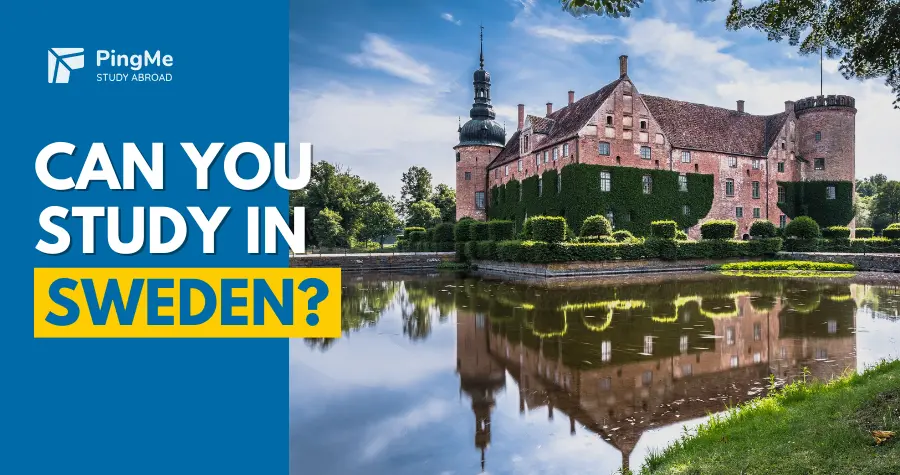October 20, 2024
Who is Eligible to Pursue a Master’s Degree in Sweden?
"Man cannot discover new oceans unless he has the courage to lose sight of the shore," Andre Gide wisely said. Nowadays, many people are taking that leap, leaving their hometowns in pursuit of better education and prospects. Sweden has become one of the top choices for young students, not just for its picturesque landscapes, midnight sun, or stunning northern lights, but for its exceptional education.

With over 900 courses taught in English, Sweden is the quintessence of a perfect study destination. It combines world-class education with a rich, innovative culture, making it an ideal place for personal and academic growth. If you're ready to take a risk and explore new horizons, Sweden might just be the perfect match for your educational journey.
Top Master's Programs in Sweden and Where to Find Them

Sweden has a fantastic selection of master's programs catering to various interests and career goals. Whether you're passionate about technology, environmental sustainability, or even fine arts, you'll find a program that fits your aspirations. Popular courses among Indians include Architecture, Biomedical Engineering, Chemistry, and Environmental Science. What's great is that most of these programs are taught in English, making it super convenient for international students to dive right in without language barriers.
When it comes to universities, some of the top institutions in Sweden include Lund University, KTH Royal Institute of Technology, and Uppsala University, all of which are globally recognized for their excellence. If you're into tech and innovation, KTH and Chalmers University are standout choices with their best engineering programs. Meanwhile, universities like Stockholm and Umea are perfect for those leaning toward the sciences or arts. The combination of world-class education, an innovative environment, and Sweden's stunning landscapes makes it an ideal place for your studies and a great stepping stone for your career.
Eligibility for Master’s Courses in Sweden
Before you start packing your bags, it’s essential to understand what it takes to secure a spot in a master’s program in Sweden. The process is quite simple and transparent, but there are a few key requirements you'll need to fulfill. From having the right academic background to meeting language proficiency standards, Sweden sets clear criteria for admission. The good news is that with a little preparation, you can easily navigate these requirements and be well on your way to starting your studies in one of Europe’s top educational destinations.
Bachelor’s Degree
You’ll need to have completed a bachelor’s degree that’s equivalent to a Swedish kandidatexamen. For Indian students, this usually means a 4-year bachelor’s degree. However, there are some exceptions where certain 3-year programs with honors are accepted. Common 4-year degrees from India that meet the requirements include Bachelor of Engineering (B.E.), Bachelor of Technology (B.Tech), and Bachelor of Pharmacy (B.Pharm). Additionally, integrated 5-year programs like Bachelor of Architecture (B.Arch) and Bachelor of Science in Agriculture (B.Sc. Agri) also meet the criteria. However, a Post Graduate Diploma (PGD) alone doesn’t qualify, so make sure your studies amount to at least 4 years in total.
English Proficiency
Since most master’s programs in Sweden are taught in English, you’ll need to demonstrate that your English skills are up to par. You can do this either through upper secondary (high school) results or by taking an internationally recognized test like IELTS or TOEFL. If you studied English at the high school level, you may already meet this requirement without needing a test score.
Specific Program Requirements
Each master’s program in Sweden might have its own set of requirements based on the field of study. This could mean needing certain courses in your bachelor’s degree, a portfolio for creative subjects, or even specific grades. Always check the specific requirements for the course you're applying to on the university’s website to be sure you meet them.
Document Submission

When applying for a master's program in Sweden, it’s essential to provide officially issued transcripts and diplomas from your university. These documents should detail all the courses you’ve completed and the corresponding grades for each semester of your bachelor’s degree. Make sure these records are dated, so it's clear when they were issued, and ensure they come directly from the appropriate office at your university, such as the Academic Registrar's Office or Examinations Office.
If you're in your final year of studies and haven't yet received your degree, you’ll need to provide evidence that you're on track to graduate, typically in the form of a provisional certificate or a document that confirms your expected completion date. It's also important to note that college-issued transcripts or mark sheets, unless from an autonomous college, usually won’t be accepted. In such cases, you should submit the provisional certificate or diploma directly from your university to demonstrate your eligibility. Always make sure your documents are as clear as possible and fulfill the specific requirements set by Swedish universities to avoid any delays in processing your application.
Proof of Identity
You’ll also need to provide a copy of your passport or some other form of identification. Make sure your name and birthdate match across all your documents. If there are any discrepancies, like a name change after marriage, you’ll need to provide official documentation to explain it.
University Admissions in Sweden takes document verification seriously, ensuring the authenticity of all submitted materials by checking with the issuing institutions. If any documents are found to be fraudulent, not only can your admission be revoked, but submitting false documents is also a violation of Swedish law and may lead to legal consequences.
Why Studying in Sweden is a Great Choice
Choosing to study in Sweden is a smart move if you're after a top-notch education combined with an amazing living experience. Known for its innovative approach, especially in fields like technology, engineering, and environmental sciences, Sweden’s universities work closely with industries to give students hands-on opportunities and real-world projects. Most master’s programs are taught in English, so there's no need to stress about language barriers. Plus, the Swedish education system fosters creativity and independent thinking, helping you build the skills you’ll need for a successful future.
In addition to the academic experience, Sweden offers excellent employment opportunities for international students, especially in sectors like IT, engineering, and sustainability. Many Swedish companies, such as IKEA, Ericsson, and Spotify, are global leaders, and students often find opportunities for internships or job placements. Furthermore, Sweden allows international graduates to apply for a residence permit to search for work after completing their studies, making it easier to transition from education to a professional career in the country.
Other Blogs
3
Feb

How to Qualify for Germany’s Opportunity Card: Eligibility Criteria Explained
Germany’s Opportunity Card offers skilled professionals an easier way to live & work in Germany. Learn about the eligibility criteria, points system, and more.
28
Jan

Why Choose German Public Universities for Your Master’s Program?
Discover why German public universities are ideal for a Master's: world-class education, tuition-free programs, vibrant culture, and excellent career prospects!
2
Jan

Germany’s Opportunity Card: A Game Changer for Skilled Professionals
Germany's Opportunity Card offers skilled professionals a simplified path to live and work in Europe's strongest economy, no job offer needed.


